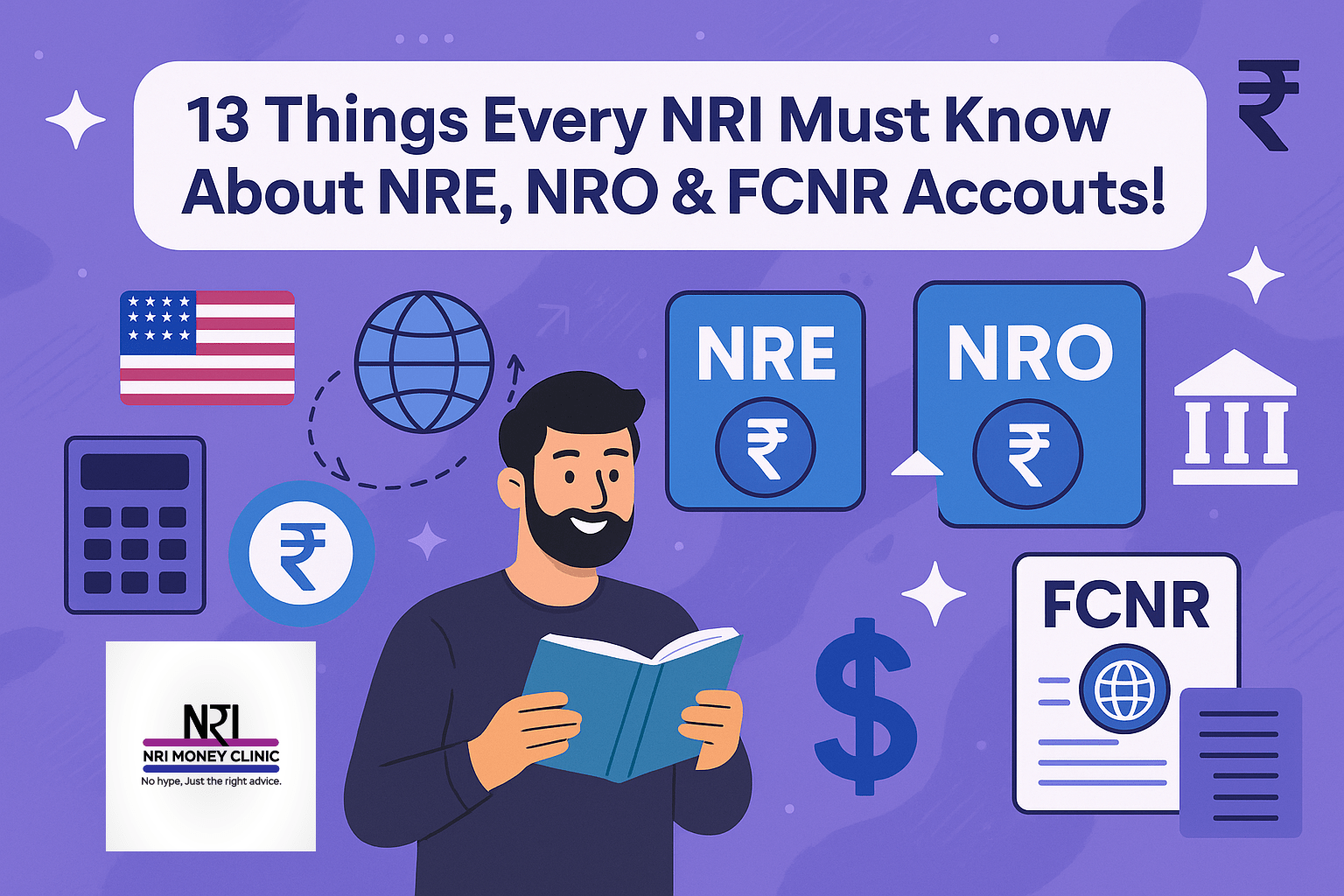Confused about NRE, NRO, and FCNR accounts? You’re not alone.
From repatriation rules to tax confusion, NRI banking can feel like a maze. But don’t worry—we’re breaking it down into 13 must-know points that’ll make managing your money in India smoother than ever.
Let’s go!
📌 1. Two Key Account Types
-
NRE (Non-Resident External) – Freely repatriable. You can send the money back abroad anytime. Great for savings and FDs.
-
NRO (Non-Resident Ordinary) – Meant for income in India (like rent, dividends). Not freely repatriable—you’ll need paperwork.
📌 2. What You Can Do With the Money
-
From NRE: Send abroad, to another NRE/NRO account, or use in India.
-
From NRO: Transfer to other NRO or domestic accounts in India.
❗ NRIs cannot hold a regular savings account. If you do, it’s a FEMA violation.
📌 3. Fixed Deposit Rules
-
NRE FD: 1 to 10 years.
-
NRO FD: As short as 7 days, up to 10 years.
📌 4. Taxation on Interest
-
NRE FD interest: Tax-free in India. But it may be taxed abroad (check your country’s tax rules).
-
NRO FD interest: Always taxable in India, no matter where you live.
-
Other investments (like mutual funds, stocks, property)? Taxable in India regardless of the account type.
📌 5. TDS (Tax Deducted at Source)
-
NRE FD: No TDS—it’s tax-free.
-
NRO FD: 30% TDS (plus surcharge).
You can reduce TDS if your country has a DTAA (Double Taxation Avoidance Agreement) with India. Also, file your tax return to claim refunds if you’ve been overcharged!
📌 6. Transferring Between Accounts
-
NRE → NRO: Easy and allowed.
-
NRO → NRE: Possible, but only with paperwork and CA certification.
📌 7. Account Types Available
Both NRE and NRO accounts can be opened as:
-
Savings accounts
-
Current accounts
-
Recurring deposits (RD)
-
Fixed deposits (FD)
📌 8. Returning to India? Know This
If you’re moving back permanently:
-
NRE funds can be shifted to RFC (Resident Foreign Currency) or FCNR accounts.
-
NRO funds cannot—unless first moved to NRE (with paperwork), then into RFC.
📌 9. Joint Holding Rules
-
You can hold NRE/NRO accounts jointly with another NRI, PIO, or OCI.
-
You can also add a resident Indian as a joint holder—but only on a former or survivor basis and only if they’re an immediate family member (spouse, parents, kids, in-laws).
📌 10. Currency Options
-
NRO: Only in INR.
-
NRE: INR or foreign currency (via FCNR).
FCNR can be in USD, GBP, EUR, CAD, AUD, and more.
📌 11. Debit & Credit Card Access
-
NRE Debit Cards: Can be used internationally.
-
NRO Debit Cards: Domestic use only.
-
Credit Cards: Usually offered against a fixed deposit as security.
📌 12. What Can You Receive Into These Accounts?
-
NRE: Inward remittance from abroad, investment proceeds (with proof), or from other NRE accounts.
-
NRO: Indian income (like rent, pension), remittances from NRE/foreign accounts, or other domestic accounts.
📌 13. Maintain Your Records
⚠️ Super important: Download and safely store your annual bank statements (NRE, NRO, FCNR).
You’ll need them for:
-
Tax filings
-
Proving fund sources (especially for insurance and property claims)
-
Answering queries from banks, tax authorities, or during repatriation
💬 Final Word:
Don’t let banking rules trip you up. Understanding these 13 basics will make your NRI banking smooth, compliant, and worry-free.
Need help? At NRI Money Clinic, we help NRIs worldwide manage investments, repatriation, retirement planning, and more—with complete peace of mind.
📲 Just message us on WhatsApp and our experts will take it from there: https://wa.link/q8rw62.


